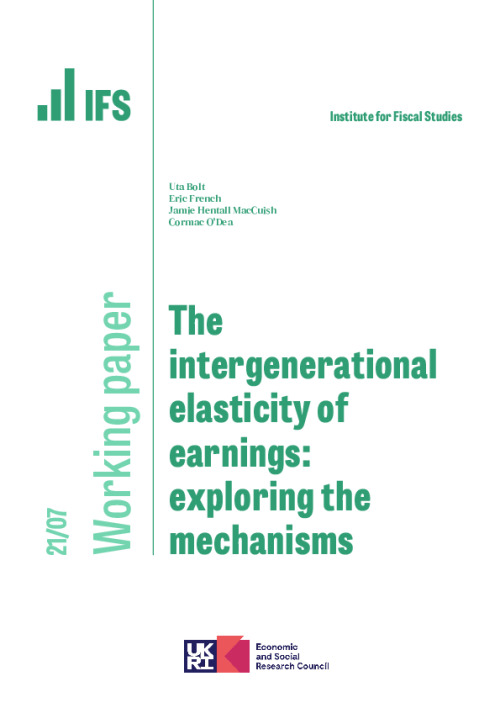Downloads
Using data covering a single cohort’s first 55 years of life, we show that most of the intergenerational elasticity of earnings (IGE) is explained by differences in: years of schooling, cognitive skills, investments of parental time and school quality, and family circumstances during childhood. To decompose the fraction of the IGE explained by each of these channels, we implement a multi-level mediation analysis combined with a latent factor framework that accounts for measurement error. Multilevel mediation analysis allows us to assess not only the direct effect of each channel on the IGE, but also its indirect effects working through the other channels, thus providing an in-depth understanding of the link between parents’ and children’s earnings. Of these channels, we show that the main driver of the IGE is increased levels of parental investments received by children of high income parents early in their lives, which encourages greater cognitive development and lifetime earnings.
Authors

CPP Co-Director
Eric is the Montague Burton Professor of Industrial Relations and Labour Economics at the University of Cambridge and Professor of Economics at UCL.

Research Associate Yale University
Cormac is a Research Associate of the IFS, an Assistant Professor of Economics at the Yale University and Research Fellow at the NBER.

Research Fellow University of Bristol
Uta is an IFS Research Fellow and University of Bristol lecturer with an interest in the development of inequalities over the lifecycle.

Research Scholar University College London
Working Paper details
- DOI
- 10.1920/wp.ifs.2021.721
- Publisher
- Institute for Fiscal Studies
Suggested citation
Bolt, U et al. (2021). The intergenerational elasticity of earnings: exploring the mechanisms. London: Institute for Fiscal Studies. Available at: https://ifs.org.uk/publications/intergenerational-elasticity-earnings-exploring-mechanisms (accessed: 4 May 2024).
More from IFS
Understand this issue

Why inheritance tax should be reformed
18 January 2024

Sure Start achieved its aims, then we threw it away
15 April 2024

Raising revenue from closing inheritance tax loopholes
18 April 2024
Policy analysis

What you need to know about the new childcare entitlements
28 March 2024

The short- and medium-term impacts of Sure Start on educational outcomes
9 April 2024

Sure Start greatly improved disadvantaged children’s GCSE results
9 April 2024
Academic research

Imagine your life at 25: Gender conformity and later-life outcomes
24 April 2024

Labour market inequality and the changing life cycle profile of male and female wages
15 April 2024

Police infrastructure, police performance, and crime: Evidence from austerity cuts
24 April 2024
